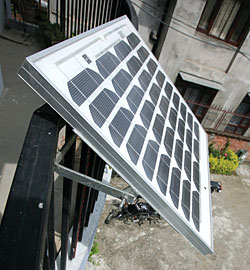 |
The government has banned the import of inverters, effective last Wednesday. It has reasoned that the inverters, which charge batteries so power is available during load-shedding hours, are inefficient and are exacerbating load-shedding. The Energy Ministry also intends to discourage the use of inverters by implementing the ban on importing inverters. The Nepal Electricity Authority also claims that if inverters were totally banned, load-shedding could be reduced by two hours daily.
In the last three years, 30 brands of inverters have been imported into the Nepali market. The inverter business is worth about Rs 500 million a year. Prices range from Rs 4000 to the hundreds of thousands. Though on the surface the ban on inverter imports appears to be positive, it only reveals the short-sightedness of those who allowed the growing use of inverters all these years. It's not as if Nepal's power shortfall, and the accompanying load-shedding, is anything new.
The government's decision has meant that the price of some imported inverters has shot up; this will only encourage the black market, which will thrive across the open border with India and the black market across the Nepal-China border at Tatopani. Smugglers will benefit - Nepali customers will suffer.
An energy use policy is imperative that takes into account the minimum necessities of citizens, such as the use of a couple of CFL bulbs. Solar energy should be encouraged, and the 'solar plan' aimed at rural and urban residents should be further developed and made attractive to customers. It is also key to plug the leakage of upto 30 per cent from the national electricity grid, find ways to link small power producers to the grid, and make arrangements with neighbouring countries to boost supply.


